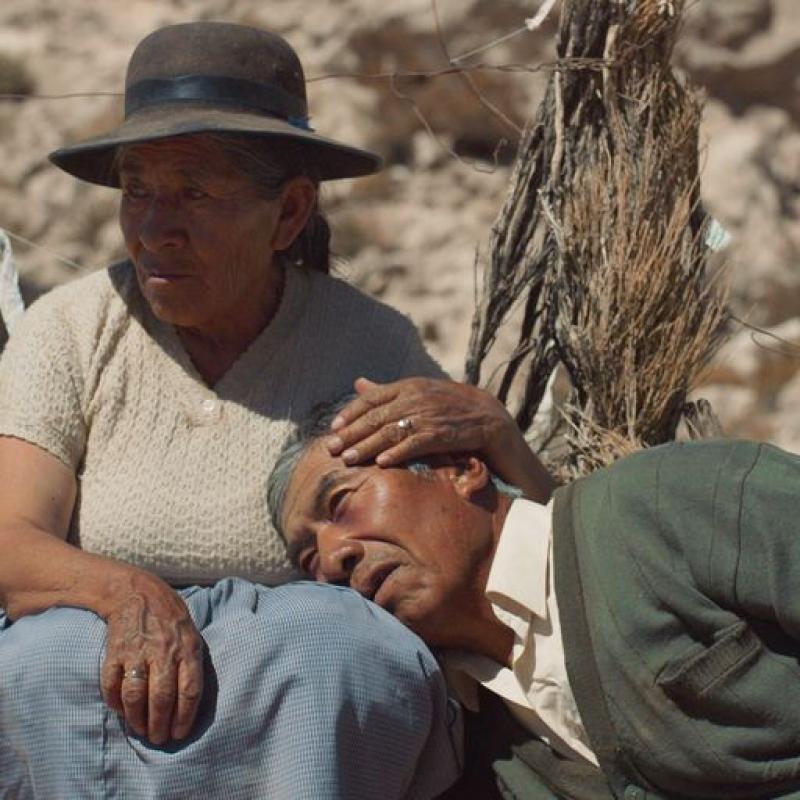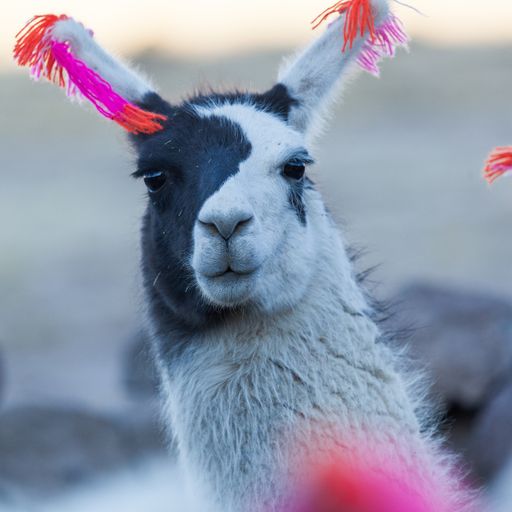Utama review - incandescent portrait of a dying way of life in Bolivia | reviews, news & interviews
Utama review - incandescent portrait of a dying way of life in Bolivia
Utama review - incandescent portrait of a dying way of life in Bolivia
Anthropological film-making meets luscious imagery in this moving drama

Utama won the World Dramatic Prize at Sundance this year and is tipped for an Oscar nomination, too. The film is set in a remote region in Bolivia’s arid highlands. Its gentle pace and non-professional actors give it a documentary feel but there is real narrative skill deployed.
Director Alejandro Loyza Grisi started off his career as a stills photographer before moving into film and it shows in the stunningly beautiful images he’s captured with cinematographer Babara Álvarez.
Virginio (José Calcina) and Sisa (Luisa Quispe) are an elderly Quechua couple who have always lived in the same small village; they’ve raised their family there and made a living as subsistence farmers with a small herd of llamas. Unprecedented droughts, doubtless caused by climate change, have devastated their way of life. Many locals have left and moved to the city, including the couple’s adult children. There’s no water left in the village pump, the remaining villagers have to walk to a stream and carry home heavy containers. As a character observes, “Time has gotten tired, we have to sow water”.
Theirs is an ancient way of life that is being forced to change by the effects of far-away industry. Even the condors are struggling to survive and the llamas with their incongruously cheery pink ribbons graze meagrely on tufts of grass in the cracked desert soil.
 When Virginio and Sisa’s grandson Clever (Santos Choque) arrives on a motorbike from the city, his phone text alerts are disconcerting in a soundscape dominated by the wind whistling and the llamas grumbling. He’s come to persuade his grandparents that now is the time to move to the city, especially as Virginio is ill.
When Virginio and Sisa’s grandson Clever (Santos Choque) arrives on a motorbike from the city, his phone text alerts are disconcerting in a soundscape dominated by the wind whistling and the llamas grumbling. He’s come to persuade his grandparents that now is the time to move to the city, especially as Virginio is ill.
Utama means “our home” in one of the indigenous languages in Bolivia. The film’s director felt that drama would be more effective in conveying his peoples’ plight than documentary. José Calcina and Luisa Quispe are a real-life married couple and utterly credible in their roles. Loyza Grisi worked closely with the pair and the local community to capture the rituals of Andean culture. Only Santos Choque playing Clever the grandson had trained as an actor.
The fusion in Utama of beautifully orchestrated images and warm, convincing performances invites its audience to immerse itself for 90 minutes in a way of life that is not only inaccessible to westerners but endangered. It’s well worth it.
rating
Explore topics
Share this article
The future of Arts Journalism
You can stop theartsdesk.com closing!
We urgently need financing to survive. Our fundraising drive has thus far raised £49,000 but we need to reach £100,000 or we will be forced to close. Please contribute here: https://gofund.me/c3f6033d
And if you can forward this information to anyone who might assist, we’d be grateful.

Subscribe to theartsdesk.com
Thank you for continuing to read our work on theartsdesk.com. For unlimited access to every article in its entirety, including our archive of more than 15,000 pieces, we're asking for £5 per month or £40 per year. We feel it's a very good deal, and hope you do too.
To take a subscription now simply click here.
And if you're looking for that extra gift for a friend or family member, why not treat them to a theartsdesk.com gift subscription?
more Film
 Blu-ray: Finis Terrae
Bleak but compelling semi-documentary, filmed on location in Brittany
Blu-ray: Finis Terrae
Bleak but compelling semi-documentary, filmed on location in Brittany
 Oslo Stories Trilogy: Sex review - sexual identity slips, hurts and heals
A quietly visionary series concludes with two chimney sweeps' awkward sexual liberation
Oslo Stories Trilogy: Sex review - sexual identity slips, hurts and heals
A quietly visionary series concludes with two chimney sweeps' awkward sexual liberation
 Sorry, Baby review - the healing power of friendship in the aftermath of sexual assault
Eva Victor writes, directs and stars in their endearing debut feature
Sorry, Baby review - the healing power of friendship in the aftermath of sexual assault
Eva Victor writes, directs and stars in their endearing debut feature
 Blu-ray: Who Wants to Kill Jessie?
Fast-paced and visually inventive Czech comedy
Blu-ray: Who Wants to Kill Jessie?
Fast-paced and visually inventive Czech comedy
 Oslo Stories Trilogy: Love review - freed love
Gay cruising offers straight female lessons in a heady ode to urban connection
Oslo Stories Trilogy: Love review - freed love
Gay cruising offers straight female lessons in a heady ode to urban connection
 Beating Hearts review - kiss kiss, slam slam
Romance and clobberings in a so-so French melodrama
Beating Hearts review - kiss kiss, slam slam
Romance and clobberings in a so-so French melodrama
 Materialists review - a misfiring romcom or an undercooked satire?
Writer-director Celine Song's latest can't decide what kind of film it is
Materialists review - a misfiring romcom or an undercooked satire?
Writer-director Celine Song's latest can't decide what kind of film it is
 theartsdesk Q&A: actor Leonie Benesch on playing an overburdened nurse in the Swiss drama 'Late Shift'
The Guildhall-trained German star talks about the enormous pressures placed on nurses and her admiration for British films and TV
theartsdesk Q&A: actor Leonie Benesch on playing an overburdened nurse in the Swiss drama 'Late Shift'
The Guildhall-trained German star talks about the enormous pressures placed on nurses and her admiration for British films and TV
 Freakier Friday review - body-swapping gone ballistic
Lindsay Lohan and Jamie Lee Curtis's comedy sequel jumbles up more than their daughter-mother duo
Freakier Friday review - body-swapping gone ballistic
Lindsay Lohan and Jamie Lee Curtis's comedy sequel jumbles up more than their daughter-mother duo
 Eight Postcards from Utopia review - ads from the era when 1990s Romania embraced capitalism
Radu Jude's documentary is a mad montage of cheesy TV commercials
Eight Postcards from Utopia review - ads from the era when 1990s Romania embraced capitalism
Radu Jude's documentary is a mad montage of cheesy TV commercials
 The Kingdom review - coming of age as the body count rises
A teen belatedly bonds with her mysterious dad in an unflinching Corsican mob drama
The Kingdom review - coming of age as the body count rises
A teen belatedly bonds with her mysterious dad in an unflinching Corsican mob drama

Add comment